Module 12 Help 模块摸底检测(含答案)
文档属性
| 名称 | Module 12 Help 模块摸底检测(含答案) | 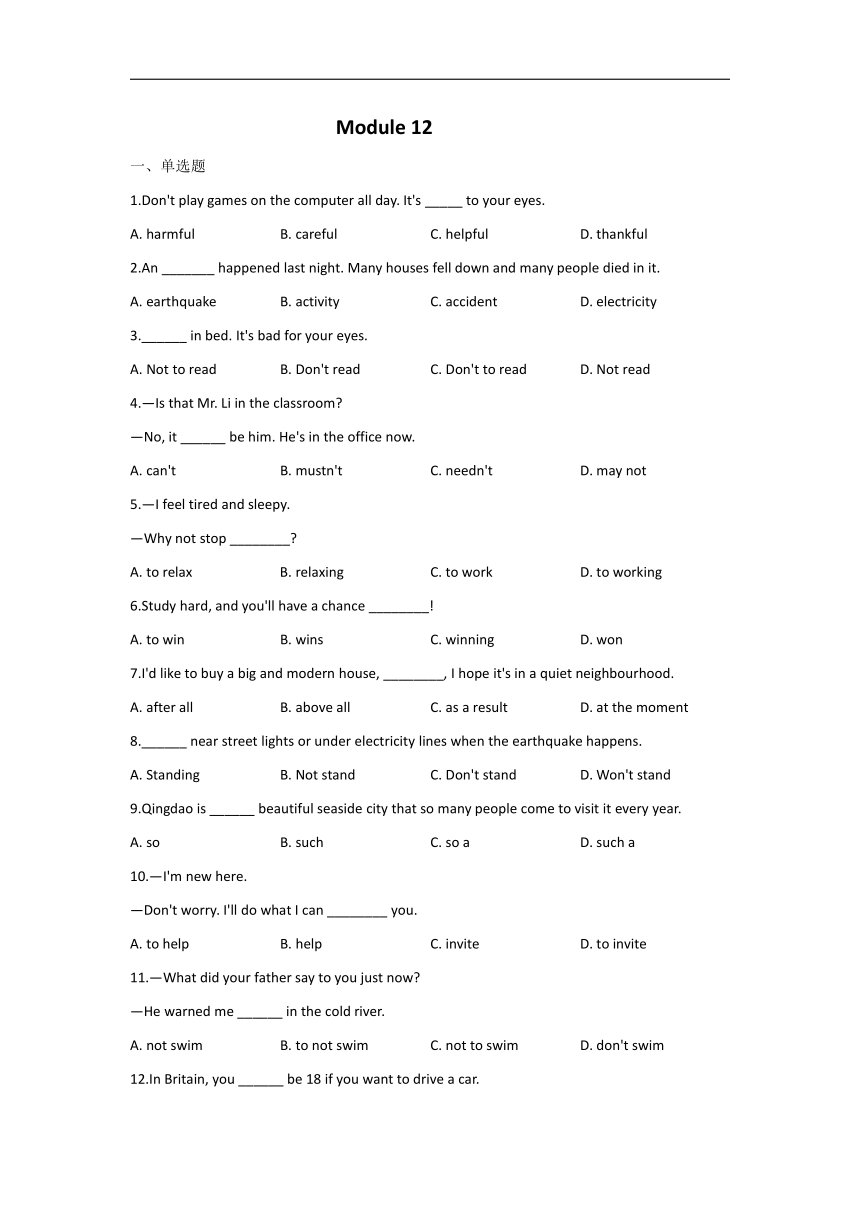 | |
| 格式 | docx | ||
| 文件大小 | 24.0KB | ||
| 资源类型 | 教案 | ||
| 版本资源 | 外研版 | ||
| 科目 | 英语 | ||
| 更新时间 | 2021-08-11 21:41:43 | ||
图片预览

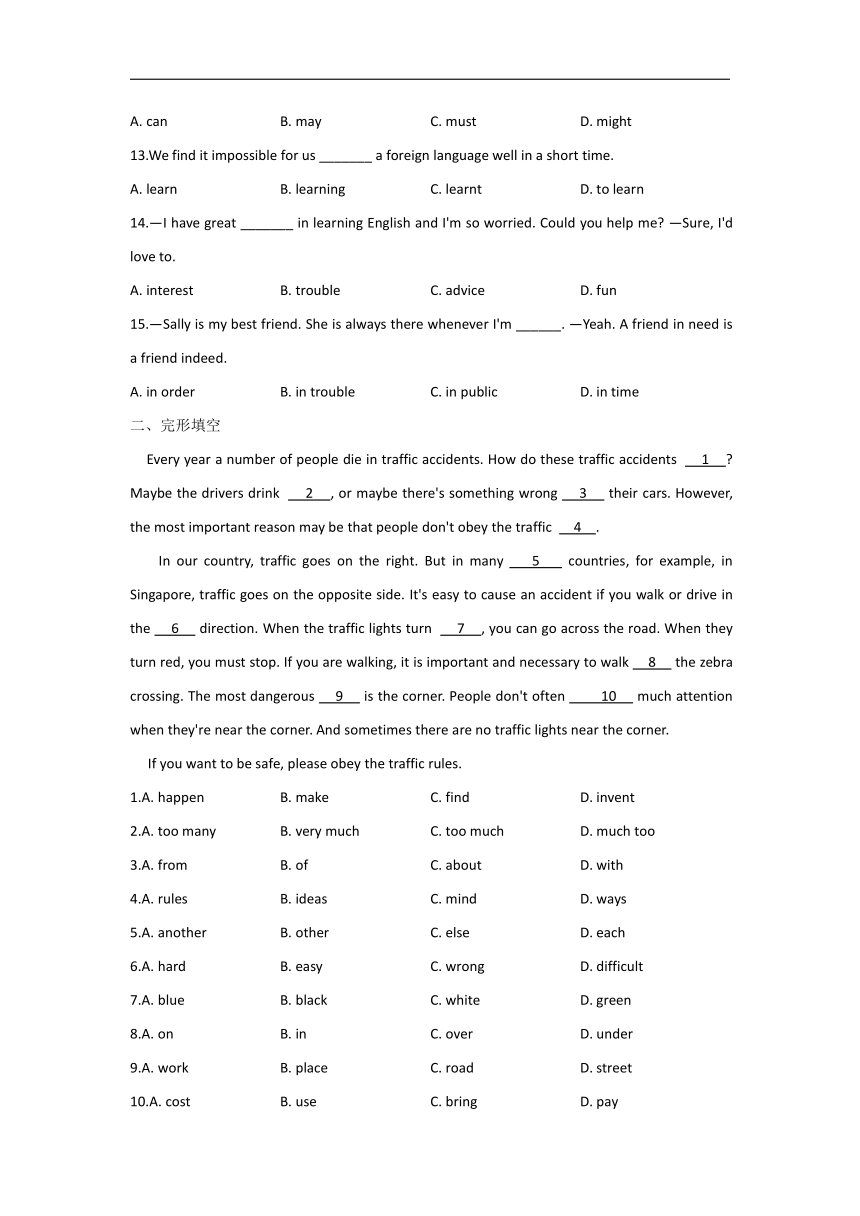
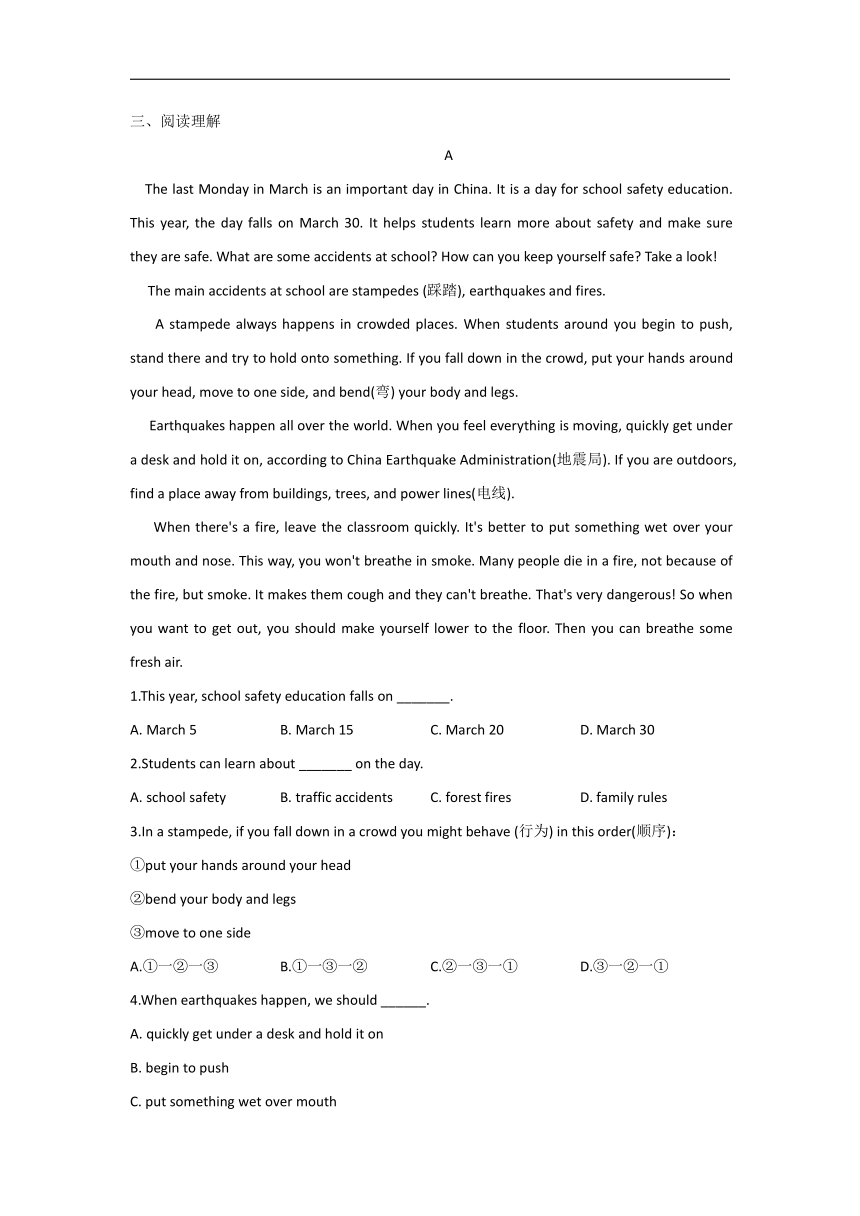
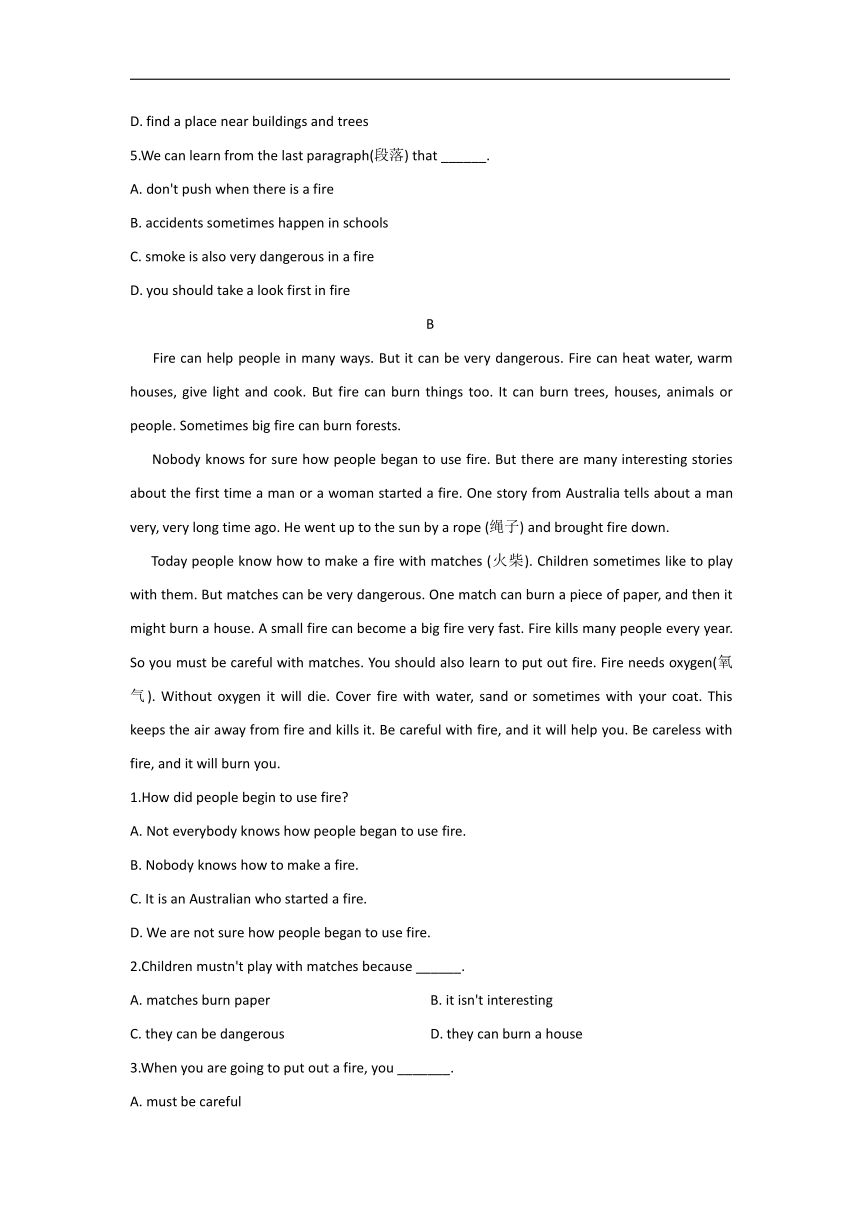
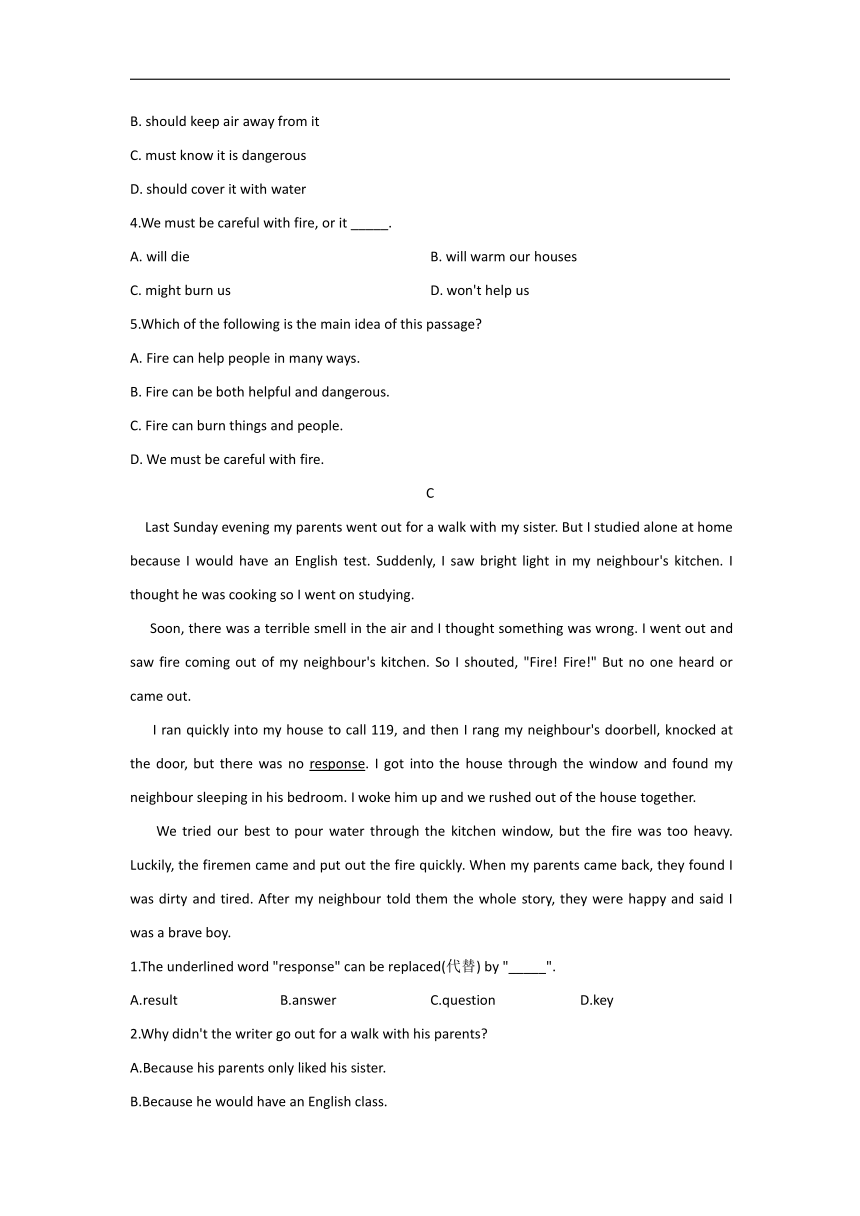
文档简介
Module
12
一、单选题
1.Don't
play
games
on
the
computer
all
day.
It's
_____
to
your
eyes.
A.
harmful
B.
careful
C.
helpful
D.
thankful
2.An
_______
happened
last
night.
Many
houses
fell
down
and
many
people
died
in
it.
A.
earthquake
B.
activity
C.
accident
D.
electricity
3.______
in
bed.
It's
bad
for
your
eyes.
A.
Not
to
read
B.
Don't
read
C.
Don't
to
read
D.
Not
read
4.—Is
that
Mr.
Li
in
the
classroom?
—No,
it
______
be
him.
He's
in
the
office
now.
A.
can't
B.
mustn't
C.
needn't
D.
may
not
5.—I
feel
tired
and
sleepy.
—Why
not
stop
________?
A.
to
relax
B.
relaxing
C.
to
work
D.
to
working
6.Study
hard,
and
you'll
have
a
chance
________!
A.
to
win
B.
wins
C.
winning
D.
won
7.I'd
like
to
buy
a
big
and
modern
house,
________,
I
hope
it's
in
a
quiet
neighbourhood.
A.
after
all
B.
above
all
C.
as
a
result
D.
at
the
moment
8.______
near
street
lights
or
under
electricity
lines
when
the
earthquake
happens.
A.
Standing
B.
Not
stand
C.
Don't
stand
D.
Won't
stand
9.Qingdao
is
______
beautiful
seaside
city
that
so
many
people
come
to
visit
it
every
year.
A.
so
B.
such
C.
so
a
D.
such
a
10.—I'm
new
here.
—Don't
worry.
I'll
do
what
I
can
________
you.
A.
to
help
B.
help
C.
invite
D.
to
invite
11.—What
did
your
father
say
to
you
just
now?
—He
warned
me
______
in
the
cold
river.
A.
not
swim
B.
to
not
swim
C.
not
to
swim
D.
don't
swim
12.In
Britain,
you
______
be
18
if
you
want
to
drive
a
car.
A.
can
B.
may
C.
must
D.
might
13.We
find
it
impossible
for
us
_______
a
foreign
language
well
in
a
short
time.
A.
learn
B.
learning
C.
learnt
D.
to
learn
14.—I
have
great
_______
in
learning
English
and
I'm
so
worried.
Could
you
help
me?
—Sure,
I'd
love
to.
A.
interest
B.
trouble
C.
advice
D.
fun
15.—Sally
is
my
best
friend.
She
is
always
there
whenever
I'm
______.
—Yeah.
A
friend
in
need
is
a
friend
indeed.
A.
in
order
B.
in
trouble
C.
in
public
D.
in
time
二、完形填空
??
Every
year
a
number
of
people
die
in
traffic
accidents.
How
do
these
traffic
accidents
??
1??
?
Maybe
the
drivers
drink
??
2??
,
or
maybe
there's
something
wrong???
3??
?their
cars.
However,
the
most
important
reason
may
be
that
people
don't
obey
the
traffic
??
4??
.
???
In
our
country,
traffic
goes
on
the
right.
But
in
many???
5??
?countries,
for
example,
in
Singapore,
traffic
goes
on
the
opposite
side.
It's
easy
to
cause
an
accident
if
you
walk
or
drive
in
the???
6??
?direction.
When
the
traffic
lights
turn
??
7??
,
you
can
go
across
the
road.
When
they
turn
red,
you
must
stop.
If
you
are
walking,
it
is
important
and
necessary
to
walk???
8??
?the
zebra
crossing.
The
most
dangerous???
9??
?is
the
corner.
People
don't
often????
10??
?much
attention
when
they're
near
the
corner.
And
sometimes
there
are
no
traffic
lights
near
the
corner.
???
If
you
want
to
be
safe,
please
obey
the
traffic
rules.
1.A.
happen
B.
make
C.
find
D.
invent
2.A.
too
many
B.
very
much
C.
too
much
D.
much
too
3.A.
from
B.
of
C.
about
D.
with
4.A.
rules
B.
ideas
C.
mind
D.
ways
5.A.
another
B.
other
C.
else
D.
each
6.A.
hard
B.
easy
C.
wrong
D.
difficult
7.A.
blue
B.
black
C.
white
D.
green
8.A.
on
B.
in
C.
over
D.
under
9.A.
work
B.
place
C.
road
D.
street
10.A.
cost
B.
use
C.
bring
D.
pay
三、阅读理解
?
?A
The
last
Monday
in
March
is
an
important
day
in
China.
It
is
a
day
for
school
safety
education.
This
year,
the
day
falls
on
March
30.
It
helps
students
learn
more
about
safety
and
make
sure
they
are
safe.
What
are
some
accidents
at
school?
How
can
you
keep
yourself
safe?
Take
a
look!
???
The
main
accidents
at
school
are
stampedes
(踩踏),
earthquakes
and
fires.
???
A
stampede
always
happens
in
crowded
places.
When
students
around
you
begin
to
push,
stand
there
and
try
to
hold
onto
something.
If
you
fall
down
in
the
crowd,
put
your
hands
around
your
head,
move
to
one
side,
and
bend(弯)
your
body
and
legs.
???
Earthquakes
happen
all
over
the
world.
When
you
feel
everything
is
moving,
quickly
get
under
a
desk
and
hold
it
on,
according
to
China
Earthquake
Administration(地震局).
If
you
are
outdoors,
find
a
place
away
from
buildings,
trees,
and
power
lines(电线).
???
When
there's
a
fire,
leave
the
classroom
quickly.
It's
better
to
put
something
wet
over
your
mouth
and
nose.
This
way,
you
won't
breathe
in
smoke.
Many
people
die
in
a
fire,
not
because
of
the
fire,
but
smoke.
It
makes
them
cough
and
they
can't
breathe.
That's
very
dangerous!
So
when
you
want
to
get
out,
you
should
make
yourself
lower
to
the
floor.
Then
you
can
breathe
some
fresh
air.
1.This
year,
school
safety
education
falls
on
_______.
A.
March
5
B.
March
15
C.
March
20
D.
March
30
2.Students
can
learn
about
_______
on
the
day.
A.
school
safety
B.
traffic
accidents
C.
forest
fires
D.
family
rules
3.In
a
stampede,
if
you
fall
down
in
a
crowd
you
might
behave
(行为)
in
this
order(顺序):
①put
your
hands
around
your
head
②bend
your
body
and
legs
③move
to
one
side
A.①一②一③
B.①一③一②
C.②一③一①
D.③一②一①
4.When
earthquakes
happen,
we
should
______.
A.
quickly
get
under
a
desk
and
hold
it
on
B.
begin
to
push
C.
put
something
wet
over
mouth
D.
find
a
place
near
buildings
and
trees
5.We
can
learn
from
the
last
paragraph(段落)
that
______.
A.
don't
push
when
there
is
a
fire
B.
accidents
sometimes
happen
in
schools
C.
smoke
is
also
very
dangerous
in
a
fire
D.
you
should
take
a
look
first
in
fire
B
???
Fire
can
help
people
in
many
ways.
But
it
can
be
very
dangerous.
Fire
can
heat
water,
warm
houses,
give
light
and
cook.
But
fire
can
burn
things
too.
It
can
burn
trees,
houses,
animals
or
people.
Sometimes
big
fire
can
burn
forests.
???
Nobody
knows
for
sure
how
people
began
to
use
fire.
But
there
are
many
interesting
stories
about
the
first
time
a
man
or
a
woman
started
a
fire.
One
story
from
Australia
tells
about
a
man
very,
very
long
time
ago.
He
went
up
to
the
sun
by
a
rope
(绳子)
and
brought
fire
down.
???
Today
people
know
how
to
make
a
fire
with
matches
(火柴).
Children
sometimes
like
to
play
with
them.
But
matches
can
be
very
dangerous.
One
match
can
burn
a
piece
of
paper,
and
then
it
might
burn
a
house.
A
small
fire
can
become
a
big
fire
very
fast.
Fire
kills
many
people
every
year.
So
you
must
be
careful
with
matches.
You
should
also
learn
to
put
out
fire.
Fire
needs
oxygen(氧气).
Without
oxygen
it
will
die.
Cover
fire
with
water,
sand
or
sometimes
with
your
coat.
This
keeps
the
air
away
from
fire
and
kills
it.
Be
careful
with
fire,
and
it
will
help
you.
Be
careless
with
fire,
and
it
will
burn
you.
1.How
did
people
begin
to
use
fire?
A.
Not
everybody
knows
how
people
began
to
use
fire.
B.
Nobody
knows
how
to
make
a
fire.
C.
It
is
an
Australian
who
started
a
fire.
D.
We
are
not
sure
how
people
began
to
use
fire.
2.Children
mustn't
play
with
matches
because
______.
A.
matches
burn
paper
B.
it
isn't
interesting
C.
they
can
be
dangerous
D.
they
can
burn
a
house
3.When
you
are
going
to
put
out
a
fire,
you
_______.
A.
must
be
careful
B.
should
keep
air
away
from
it
C.
must
know
it
is
dangerous
D.
should
cover
it
with
water
4.We
must
be
careful
with
fire,
or
it
_____.
A.
will
die
B.
will
warm
our
houses
C.
might
burn
us
D.
won't
help
us
5.Which
of
the
following
is
the
main
idea
of
this
passage?
A.
Fire
can
help
people
in
many
ways.
B.
Fire
can
be
both
helpful
and
dangerous.
C.
Fire
can
burn
things
and
people.
D.
We
must
be
careful
with
fire.
C
??
Last
Sunday
evening
my
parents
went
out
for
a
walk
with
my
sister.
But
I
studied
alone
at
home
because
I
would
have
an
English
test.
Suddenly,
I
saw
bright
light
in
my
neighbour's
kitchen.
I
thought
he
was
cooking
so
I
went
on
studying.
???
Soon,
there
was
a
terrible
smell
in
the
air
and
I
thought
something
was
wrong.
I
went
out
and
saw
fire
coming
out
of
my
neighbour's
kitchen.
So
I
shouted,
"Fire!
Fire!"
But
no
one
heard
or
came
out.
???
I
ran
quickly
into
my
house
to
call
119,
and
then
I
rang
my
neighbour's
doorbell,
knocked
at
the
door,
but
there
was
no
response.
I
got
into
the
house
through
the
window
and
found
my
neighbour
sleeping
in
his
bedroom.
I
woke
him
up
and
we
rushed
out
of
the
house
together.
???
We
tried
our
best
to
pour
water
through
the
kitchen
window,
but
the
fire
was
too
heavy.
Luckily,
the
firemen
came
and
put
out
the
fire
quickly.
When
my
parents
came
back,
they
found?I
was
dirty
and
tired.
After
my
neighbour
told
them
the
whole
story,
they
were
happy
and
said
I
was
a
brave
boy.
1.The
underlined
word
"response"
can
be
replaced(代替)
by
"_____".
A.result
B.answer
C.question
D.key
2.Why
didn't
the
writer
go
out
for
a
walk
with
his
parents?
A.Because
his
parents
only
liked
his
sister.
B.Because
he
would
have
an
English
class.
C.Because
he
had
to
study
for
an
English
test.
D.Because
there
was
a
fire
in
his
neighbour's
kitchen.
3.Who
put
out
the
fire
at
last?
A.The
writer.
B.The
writer's
parents.
C.The
writer's
neighbour.
D.The
firemen.
4.According
to
the
passage,
which
of
the
following
is
TRUE?
A.The
writer's
neighbour
was
sleeping
when
the
fire
started.
B.No
one
helped
the
writer's
neighbour
put
out
the
fire.
C.The
fire
happened
last
Friday
evening.
D.The
writer's
parents
were
angry
when
they
knew
what
had
happened.
5.What's
the
passage
mainly
about?
A.How
to
put
out
a
fire.
B.My
neighbour
was
a
brave
man.
C.I
saved
my
neighbour
from
the
fire.
D.I
studied
for
a
test
at
home.
四、补全对话
A:?I
have
good
news
to
you.
B:
①_____
A:
We
will
go
rock
climbing
tomorrow
morning.
B:
Really?
It's
wonderful!
②_____
A:
We
can
find
a
guide.
Maybe
there
are
some
rules.
B:
Of
course.
③_____
A:
We
mustn't
walk
along
the
edge,
either.
B:
④_____
A:
I
don't
know.
Maybe
there
are
some
more
rules.?⑤_____
B:
OK.
Let's
get
ready.
A.
I
think
the
guide
will
tell
us.
B.
What?
C.
For
example,
we
must
use
ropes.
D.
Who
will
lead
the
way?
E.
Is
that
all?
五、完成句子
1.妈妈总是告诉我不要和这只狗接触。
Mum
always
tells
me
to
_______
_______
_______?the
dog.
2.危险。小心落石!
It's
dangerous.?______
______
______
falling
rocks!
3.她是一位很好的医生,我们都非常爱她。
She
is?_______
a
good
doctor?_______
all
of
us
love
her
very
much.
4.这节课我们要学习有关急救的知识。
This
class
we're
going
to
learn
something
about
_______
_______.
5.不要从高楼跳出去。
Don't
_____
_____
_____
high
buildings.
六、首字母填空
1.My
brother
d______?
my
glasses
and
broke
them.
2.We
usually
like
climbing
the
s_____?instead
of
taking
lifts
in
not
very
tall
buildings.
3.Can
you
i_____
what
it
would
be
like
to
live
under
the
sea?
4.In
the
mountains,
be
careful
of
f_____
rocks.
5.Don't
stand
near
street
lights
or
under
p_____
lines.
6.Stay
away
from
w_____
and
heavy
furniture.
7.Here's
some
a_____
about
what
to
do.
8.E_____
often
happen
suddenly,
so
it's
difficult
to
warn
people
about
them.
七、书面表达
暑假来临时,在炎热的天气里,我们都喜欢游泳,但我们一定要注意安全。假设你是李明,本周末班里要举行英语角活动,用英语讨论游泳安全问题。请你用英语写一篇简短的发言稿。
要点如下:
1.?游泳有益健康,但在一些地方游泳不安全。
2.?不要独自到河中或湖中游泳,应有父母或朋友陪伴。
3.?游泳前做好准备工作,不要仓促下水。
4.?游泳时相互关照;时间不要太长。
5.?写一至两点个人建议。
注意:
1.80词左右,发言稿的开头已给出,不计入总词数。
?2.参考词汇:
in
a
hurry
仓促地
Fellow
students,
__________________________________________________________________________________________________________________________________________________________________________
答案以及解析
一、
1.答案:A
解析:考查形容词。句意:
不要整天在电脑上玩游戏,
它对你的眼睛有害。考查固定短语be
harmful
to,
意为"对……有害"。故选A。
2.答案:A
3.答案:B
4.答案:A
5.答案:A
6.答案:A
7.答案:B
8.答案:C
9.答案:D
10.答案:A
11.答案:C
12.答案:C
13.答案:D
14.答案:B
15.答案:B
二、答案:1-5
ACDAB
6-10
CDABD
三、A答案:1-5
DABAC
B答案:1-5
DCBCD
C答案:1-5
BCDAC
解析:1.由文意可知response此处意为"应答"。故选B。
2.由第一段第二句"But
I
studied
alone
at
home
because
I
would
have
an
English
test."可知,
因为作者在家备战英语测试,
所以没有和父母出去散步。
3.根据题干中的关键信息put
out,
查找到第四段第二句"Luckily,
the
firemen
came
and
put
out
the
fire
quickly."可知,
最后消防员把火扑灭了。
4.根据第三段倒数第二句"I
got
into
the
house
through
the
window
and
found
my
neighbour
sleeping
in
his
bedroom."可知,
当着火的时候,
作者的邻居正在睡觉。故A项与原文相符。
5.本文作者讲述了如何帮助家中失火的邻居逃离危险的故事,
故答案为C。
四、答案:①-⑤
BDCEA
五、
1.答案:keep
clear
of
2.答案:Be
careful
of
3.答案:such;that
4.答案:first
aid
5.答案:jump
out
of
六、
1.答案:dropped
2.答案:stairs
3.答案:imagine
4.答案:falling
5.答案:power
6.答案:windows
7.答案:advice
8.答案:Earthquakes
七、答案:
Fellow
students,
As
we
know,
swimming
is
a
nice
sport
and
a
good
way
to
keep
us
fit.
But
remember
some
places
are
not
so
safe
for
us
to
swim
in.
Don't
go
to
rivers
or
lakes
alone.
It's
better
to
go
with
our
parents
or
friends.
Before
swimming,
get
ready
for
it
and
don't
get
into
the
water
in
a
hurry.
While
swimming,
try
to
look
after
each
other.
We'd
better
not
stay
in
the
water
too
long.
And
don't
swim
too
far.
Enjoy
it
when
you
go
for
a
swim.
12
一、单选题
1.Don't
play
games
on
the
computer
all
day.
It's
_____
to
your
eyes.
A.
harmful
B.
careful
C.
helpful
D.
thankful
2.An
_______
happened
last
night.
Many
houses
fell
down
and
many
people
died
in
it.
A.
earthquake
B.
activity
C.
accident
D.
electricity
3.______
in
bed.
It's
bad
for
your
eyes.
A.
Not
to
read
B.
Don't
read
C.
Don't
to
read
D.
Not
read
4.—Is
that
Mr.
Li
in
the
classroom?
—No,
it
______
be
him.
He's
in
the
office
now.
A.
can't
B.
mustn't
C.
needn't
D.
may
not
5.—I
feel
tired
and
sleepy.
—Why
not
stop
________?
A.
to
relax
B.
relaxing
C.
to
work
D.
to
working
6.Study
hard,
and
you'll
have
a
chance
________!
A.
to
win
B.
wins
C.
winning
D.
won
7.I'd
like
to
buy
a
big
and
modern
house,
________,
I
hope
it's
in
a
quiet
neighbourhood.
A.
after
all
B.
above
all
C.
as
a
result
D.
at
the
moment
8.______
near
street
lights
or
under
electricity
lines
when
the
earthquake
happens.
A.
Standing
B.
Not
stand
C.
Don't
stand
D.
Won't
stand
9.Qingdao
is
______
beautiful
seaside
city
that
so
many
people
come
to
visit
it
every
year.
A.
so
B.
such
C.
so
a
D.
such
a
10.—I'm
new
here.
—Don't
worry.
I'll
do
what
I
can
________
you.
A.
to
help
B.
help
C.
invite
D.
to
invite
11.—What
did
your
father
say
to
you
just
now?
—He
warned
me
______
in
the
cold
river.
A.
not
swim
B.
to
not
swim
C.
not
to
swim
D.
don't
swim
12.In
Britain,
you
______
be
18
if
you
want
to
drive
a
car.
A.
can
B.
may
C.
must
D.
might
13.We
find
it
impossible
for
us
_______
a
foreign
language
well
in
a
short
time.
A.
learn
B.
learning
C.
learnt
D.
to
learn
14.—I
have
great
_______
in
learning
English
and
I'm
so
worried.
Could
you
help
me?
—Sure,
I'd
love
to.
A.
interest
B.
trouble
C.
advice
D.
fun
15.—Sally
is
my
best
friend.
She
is
always
there
whenever
I'm
______.
—Yeah.
A
friend
in
need
is
a
friend
indeed.
A.
in
order
B.
in
trouble
C.
in
public
D.
in
time
二、完形填空
??
Every
year
a
number
of
people
die
in
traffic
accidents.
How
do
these
traffic
accidents
??
1??
?
Maybe
the
drivers
drink
??
2??
,
or
maybe
there's
something
wrong???
3??
?their
cars.
However,
the
most
important
reason
may
be
that
people
don't
obey
the
traffic
??
4??
.
???
In
our
country,
traffic
goes
on
the
right.
But
in
many???
5??
?countries,
for
example,
in
Singapore,
traffic
goes
on
the
opposite
side.
It's
easy
to
cause
an
accident
if
you
walk
or
drive
in
the???
6??
?direction.
When
the
traffic
lights
turn
??
7??
,
you
can
go
across
the
road.
When
they
turn
red,
you
must
stop.
If
you
are
walking,
it
is
important
and
necessary
to
walk???
8??
?the
zebra
crossing.
The
most
dangerous???
9??
?is
the
corner.
People
don't
often????
10??
?much
attention
when
they're
near
the
corner.
And
sometimes
there
are
no
traffic
lights
near
the
corner.
???
If
you
want
to
be
safe,
please
obey
the
traffic
rules.
1.A.
happen
B.
make
C.
find
D.
invent
2.A.
too
many
B.
very
much
C.
too
much
D.
much
too
3.A.
from
B.
of
C.
about
D.
with
4.A.
rules
B.
ideas
C.
mind
D.
ways
5.A.
another
B.
other
C.
else
D.
each
6.A.
hard
B.
easy
C.
wrong
D.
difficult
7.A.
blue
B.
black
C.
white
D.
green
8.A.
on
B.
in
C.
over
D.
under
9.A.
work
B.
place
C.
road
D.
street
10.A.
cost
B.
use
C.
bring
D.
pay
三、阅读理解
?
?A
The
last
Monday
in
March
is
an
important
day
in
China.
It
is
a
day
for
school
safety
education.
This
year,
the
day
falls
on
March
30.
It
helps
students
learn
more
about
safety
and
make
sure
they
are
safe.
What
are
some
accidents
at
school?
How
can
you
keep
yourself
safe?
Take
a
look!
???
The
main
accidents
at
school
are
stampedes
(踩踏),
earthquakes
and
fires.
???
A
stampede
always
happens
in
crowded
places.
When
students
around
you
begin
to
push,
stand
there
and
try
to
hold
onto
something.
If
you
fall
down
in
the
crowd,
put
your
hands
around
your
head,
move
to
one
side,
and
bend(弯)
your
body
and
legs.
???
Earthquakes
happen
all
over
the
world.
When
you
feel
everything
is
moving,
quickly
get
under
a
desk
and
hold
it
on,
according
to
China
Earthquake
Administration(地震局).
If
you
are
outdoors,
find
a
place
away
from
buildings,
trees,
and
power
lines(电线).
???
When
there's
a
fire,
leave
the
classroom
quickly.
It's
better
to
put
something
wet
over
your
mouth
and
nose.
This
way,
you
won't
breathe
in
smoke.
Many
people
die
in
a
fire,
not
because
of
the
fire,
but
smoke.
It
makes
them
cough
and
they
can't
breathe.
That's
very
dangerous!
So
when
you
want
to
get
out,
you
should
make
yourself
lower
to
the
floor.
Then
you
can
breathe
some
fresh
air.
1.This
year,
school
safety
education
falls
on
_______.
A.
March
5
B.
March
15
C.
March
20
D.
March
30
2.Students
can
learn
about
_______
on
the
day.
A.
school
safety
B.
traffic
accidents
C.
forest
fires
D.
family
rules
3.In
a
stampede,
if
you
fall
down
in
a
crowd
you
might
behave
(行为)
in
this
order(顺序):
①put
your
hands
around
your
head
②bend
your
body
and
legs
③move
to
one
side
A.①一②一③
B.①一③一②
C.②一③一①
D.③一②一①
4.When
earthquakes
happen,
we
should
______.
A.
quickly
get
under
a
desk
and
hold
it
on
B.
begin
to
push
C.
put
something
wet
over
mouth
D.
find
a
place
near
buildings
and
trees
5.We
can
learn
from
the
last
paragraph(段落)
that
______.
A.
don't
push
when
there
is
a
fire
B.
accidents
sometimes
happen
in
schools
C.
smoke
is
also
very
dangerous
in
a
fire
D.
you
should
take
a
look
first
in
fire
B
???
Fire
can
help
people
in
many
ways.
But
it
can
be
very
dangerous.
Fire
can
heat
water,
warm
houses,
give
light
and
cook.
But
fire
can
burn
things
too.
It
can
burn
trees,
houses,
animals
or
people.
Sometimes
big
fire
can
burn
forests.
???
Nobody
knows
for
sure
how
people
began
to
use
fire.
But
there
are
many
interesting
stories
about
the
first
time
a
man
or
a
woman
started
a
fire.
One
story
from
Australia
tells
about
a
man
very,
very
long
time
ago.
He
went
up
to
the
sun
by
a
rope
(绳子)
and
brought
fire
down.
???
Today
people
know
how
to
make
a
fire
with
matches
(火柴).
Children
sometimes
like
to
play
with
them.
But
matches
can
be
very
dangerous.
One
match
can
burn
a
piece
of
paper,
and
then
it
might
burn
a
house.
A
small
fire
can
become
a
big
fire
very
fast.
Fire
kills
many
people
every
year.
So
you
must
be
careful
with
matches.
You
should
also
learn
to
put
out
fire.
Fire
needs
oxygen(氧气).
Without
oxygen
it
will
die.
Cover
fire
with
water,
sand
or
sometimes
with
your
coat.
This
keeps
the
air
away
from
fire
and
kills
it.
Be
careful
with
fire,
and
it
will
help
you.
Be
careless
with
fire,
and
it
will
burn
you.
1.How
did
people
begin
to
use
fire?
A.
Not
everybody
knows
how
people
began
to
use
fire.
B.
Nobody
knows
how
to
make
a
fire.
C.
It
is
an
Australian
who
started
a
fire.
D.
We
are
not
sure
how
people
began
to
use
fire.
2.Children
mustn't
play
with
matches
because
______.
A.
matches
burn
paper
B.
it
isn't
interesting
C.
they
can
be
dangerous
D.
they
can
burn
a
house
3.When
you
are
going
to
put
out
a
fire,
you
_______.
A.
must
be
careful
B.
should
keep
air
away
from
it
C.
must
know
it
is
dangerous
D.
should
cover
it
with
water
4.We
must
be
careful
with
fire,
or
it
_____.
A.
will
die
B.
will
warm
our
houses
C.
might
burn
us
D.
won't
help
us
5.Which
of
the
following
is
the
main
idea
of
this
passage?
A.
Fire
can
help
people
in
many
ways.
B.
Fire
can
be
both
helpful
and
dangerous.
C.
Fire
can
burn
things
and
people.
D.
We
must
be
careful
with
fire.
C
??
Last
Sunday
evening
my
parents
went
out
for
a
walk
with
my
sister.
But
I
studied
alone
at
home
because
I
would
have
an
English
test.
Suddenly,
I
saw
bright
light
in
my
neighbour's
kitchen.
I
thought
he
was
cooking
so
I
went
on
studying.
???
Soon,
there
was
a
terrible
smell
in
the
air
and
I
thought
something
was
wrong.
I
went
out
and
saw
fire
coming
out
of
my
neighbour's
kitchen.
So
I
shouted,
"Fire!
Fire!"
But
no
one
heard
or
came
out.
???
I
ran
quickly
into
my
house
to
call
119,
and
then
I
rang
my
neighbour's
doorbell,
knocked
at
the
door,
but
there
was
no
response.
I
got
into
the
house
through
the
window
and
found
my
neighbour
sleeping
in
his
bedroom.
I
woke
him
up
and
we
rushed
out
of
the
house
together.
???
We
tried
our
best
to
pour
water
through
the
kitchen
window,
but
the
fire
was
too
heavy.
Luckily,
the
firemen
came
and
put
out
the
fire
quickly.
When
my
parents
came
back,
they
found?I
was
dirty
and
tired.
After
my
neighbour
told
them
the
whole
story,
they
were
happy
and
said
I
was
a
brave
boy.
1.The
underlined
word
"response"
can
be
replaced(代替)
by
"_____".
A.result
B.answer
C.question
D.key
2.Why
didn't
the
writer
go
out
for
a
walk
with
his
parents?
A.Because
his
parents
only
liked
his
sister.
B.Because
he
would
have
an
English
class.
C.Because
he
had
to
study
for
an
English
test.
D.Because
there
was
a
fire
in
his
neighbour's
kitchen.
3.Who
put
out
the
fire
at
last?
A.The
writer.
B.The
writer's
parents.
C.The
writer's
neighbour.
D.The
firemen.
4.According
to
the
passage,
which
of
the
following
is
TRUE?
A.The
writer's
neighbour
was
sleeping
when
the
fire
started.
B.No
one
helped
the
writer's
neighbour
put
out
the
fire.
C.The
fire
happened
last
Friday
evening.
D.The
writer's
parents
were
angry
when
they
knew
what
had
happened.
5.What's
the
passage
mainly
about?
A.How
to
put
out
a
fire.
B.My
neighbour
was
a
brave
man.
C.I
saved
my
neighbour
from
the
fire.
D.I
studied
for
a
test
at
home.
四、补全对话
A:?I
have
good
news
to
you.
B:
①_____
A:
We
will
go
rock
climbing
tomorrow
morning.
B:
Really?
It's
wonderful!
②_____
A:
We
can
find
a
guide.
Maybe
there
are
some
rules.
B:
Of
course.
③_____
A:
We
mustn't
walk
along
the
edge,
either.
B:
④_____
A:
I
don't
know.
Maybe
there
are
some
more
rules.?⑤_____
B:
OK.
Let's
get
ready.
A.
I
think
the
guide
will
tell
us.
B.
What?
C.
For
example,
we
must
use
ropes.
D.
Who
will
lead
the
way?
E.
Is
that
all?
五、完成句子
1.妈妈总是告诉我不要和这只狗接触。
Mum
always
tells
me
to
_______
_______
_______?the
dog.
2.危险。小心落石!
It's
dangerous.?______
______
______
falling
rocks!
3.她是一位很好的医生,我们都非常爱她。
She
is?_______
a
good
doctor?_______
all
of
us
love
her
very
much.
4.这节课我们要学习有关急救的知识。
This
class
we're
going
to
learn
something
about
_______
_______.
5.不要从高楼跳出去。
Don't
_____
_____
_____
high
buildings.
六、首字母填空
1.My
brother
d______?
my
glasses
and
broke
them.
2.We
usually
like
climbing
the
s_____?instead
of
taking
lifts
in
not
very
tall
buildings.
3.Can
you
i_____
what
it
would
be
like
to
live
under
the
sea?
4.In
the
mountains,
be
careful
of
f_____
rocks.
5.Don't
stand
near
street
lights
or
under
p_____
lines.
6.Stay
away
from
w_____
and
heavy
furniture.
7.Here's
some
a_____
about
what
to
do.
8.E_____
often
happen
suddenly,
so
it's
difficult
to
warn
people
about
them.
七、书面表达
暑假来临时,在炎热的天气里,我们都喜欢游泳,但我们一定要注意安全。假设你是李明,本周末班里要举行英语角活动,用英语讨论游泳安全问题。请你用英语写一篇简短的发言稿。
要点如下:
1.?游泳有益健康,但在一些地方游泳不安全。
2.?不要独自到河中或湖中游泳,应有父母或朋友陪伴。
3.?游泳前做好准备工作,不要仓促下水。
4.?游泳时相互关照;时间不要太长。
5.?写一至两点个人建议。
注意:
1.80词左右,发言稿的开头已给出,不计入总词数。
?2.参考词汇:
in
a
hurry
仓促地
Fellow
students,
__________________________________________________________________________________________________________________________________________________________________________
答案以及解析
一、
1.答案:A
解析:考查形容词。句意:
不要整天在电脑上玩游戏,
它对你的眼睛有害。考查固定短语be
harmful
to,
意为"对……有害"。故选A。
2.答案:A
3.答案:B
4.答案:A
5.答案:A
6.答案:A
7.答案:B
8.答案:C
9.答案:D
10.答案:A
11.答案:C
12.答案:C
13.答案:D
14.答案:B
15.答案:B
二、答案:1-5
ACDAB
6-10
CDABD
三、A答案:1-5
DABAC
B答案:1-5
DCBCD
C答案:1-5
BCDAC
解析:1.由文意可知response此处意为"应答"。故选B。
2.由第一段第二句"But
I
studied
alone
at
home
because
I
would
have
an
English
test."可知,
因为作者在家备战英语测试,
所以没有和父母出去散步。
3.根据题干中的关键信息put
out,
查找到第四段第二句"Luckily,
the
firemen
came
and
put
out
the
fire
quickly."可知,
最后消防员把火扑灭了。
4.根据第三段倒数第二句"I
got
into
the
house
through
the
window
and
found
my
neighbour
sleeping
in
his
bedroom."可知,
当着火的时候,
作者的邻居正在睡觉。故A项与原文相符。
5.本文作者讲述了如何帮助家中失火的邻居逃离危险的故事,
故答案为C。
四、答案:①-⑤
BDCEA
五、
1.答案:keep
clear
of
2.答案:Be
careful
of
3.答案:such;that
4.答案:first
aid
5.答案:jump
out
of
六、
1.答案:dropped
2.答案:stairs
3.答案:imagine
4.答案:falling
5.答案:power
6.答案:windows
7.答案:advice
8.答案:Earthquakes
七、答案:
Fellow
students,
As
we
know,
swimming
is
a
nice
sport
and
a
good
way
to
keep
us
fit.
But
remember
some
places
are
not
so
safe
for
us
to
swim
in.
Don't
go
to
rivers
or
lakes
alone.
It's
better
to
go
with
our
parents
or
friends.
Before
swimming,
get
ready
for
it
and
don't
get
into
the
water
in
a
hurry.
While
swimming,
try
to
look
after
each
other.
We'd
better
not
stay
in
the
water
too
long.
And
don't
swim
too
far.
Enjoy
it
when
you
go
for
a
swim.
同课章节目录
- Module 1 How to learn English
- Unit 1 Let's try to speak English as much as possi
- Unit 2 You should smile at her.
- Unit 3 Language in use .
- Module 2 My home town and my country
- Unit 1 It's taller than many other buildings.
- Unit 2 Cambridge is a beautiful city in the east o
- Unit 3 Language in use .
- Module 3 Sports.
- Unit 1 Nothing is more exciting than playing tenni
- Unit 2 This year we training more carefully.
- Unit 3 Language in use .
- Module 4 Planes, ships and trains .
- Unit 1 He lives the farthest from school.
- Unit 2 What is the best way to travel.
- Unit 3 Language in use .
- Module 5 Lao She Teahouse.
- Unit 1 I wanted to see the Beijing Opera.
- Unit 2 It descibes the changes in Chinese society.
- Unit 3 Language in use .
- Module 6 Animals in danger.
- Unit 1 It allows people to get closer to them .
- Unit 2 The WWF is working hard to save them all.
- Unit 3 Language in use .
- Revision module A
- Module 7 A famous story
- Unit 1 Alice was sitting with her sister by the ri
- Unit 2 She was thinking about her cat.
- Unit 3 Language in use .
- Module 8 Accidents
- Unit 1 While the car were changing to red, a car s
- Unit 2 I was trying to pick it up when it bite me
- Unit 3 Language in use .
- Module 9 Population
- Unit 1 The population of China is about 1.37 billi
- Unit 2 Arnwick was a city with 200,000 people.
- Unit 3 Language in use .
- Module 10 The weathe
- Unit 1 It might snow.
- Unit 2 The weather is fine all year round.
- Unit 3 Language in use .
- Module 11 Way of life
- Unit 1 In China ,we open a gift later.
- Unit 2 In England, you usually drink tea with milk
- Unit 3 Language in use .
- Module 12 Help
- Unit 1 What should we do before help arrives?
- Unit 2 Stay away from windows and heavy furniture.
- Unit 3 Language in use .
- Revision module B
